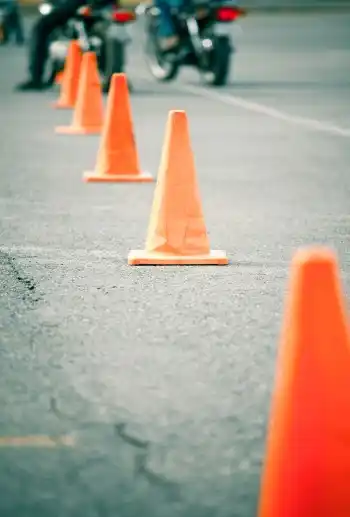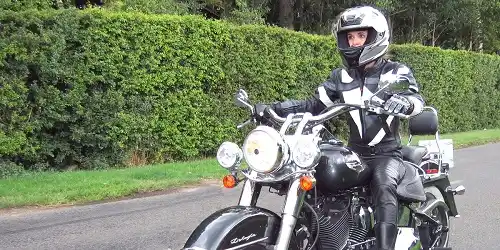Book a motorbike test in Ilford, Greater London with any of the companies listed here
Click on any of the motorcycle training schools below to view more information and check availability.
Camrider London
Lee Valley Athletics Centre (Car Park), Meridian Way, Lower Edmonton, London, Greater London, N9 0AR
Approx. distance: 7.2 miles
SL Motorcycle Training Dagenham
Barking Rugby Union Football Club, Dagenham, London, RM9 4TX
Approx. distance: 2.7 miles
Universal Motorcycle Training Dagenham
Goals Dagenham, Ripple Road, Dagenham, Greater London, RM9 6XW
Approx. distance: 3 miles
Edventure Rider Chingford
3 Morrison Avenue, Chingford, London, Greater London, E4 8SN
Approx. distance: 5.4 miles
Moto Pass Motorcycle Training Ltd Welling
Harris Academy (Falconwood), The Green, Welling, Kent, DA16 2PE
Approx. distance: 6.9 miles
Universal Motorcycle Training Edgware
Goals Eltham, Eltham Palace Road, London, Greater London, SE9 5LU
Approx. distance: 7.7 miles
BLT Motorcycle Training Thamesmead
The Crossness Engines, Thames Water Sewage Treatment works, Thamesmead, East London, SE2 9AN
Approx. distance: 4.4 miles
Probike Training Chigwell Epping
Chigwell Hall, Highroad, Chigwell, IG7 6BD
Approx. distance: 4.8 miles
Ride Motorcycle Training Romford
The Car Drome, Upper Rainham Road, Hornchurch, RM12 4EU
Approx. distance: 4.9 miles
ACBT London Greenwich
Kidbrooke Playing Fields, Dursley Road, London, Greater London, SE3 8PB
Approx. distance: 6.5 miles

Find a motorbike test in Ilford, Greater London
If you are looking for a motorbike test in Ilford then look no further! We have all the information here for you to find suitable motorcycle training and testing close to you or in the surrounding areas of Barking, Redbridge and East Ham.
What are the different types of motorcycle licence I can get in Ilford?
There are 4 main types of full motorcycle licence issued by the DVSA. The first three (AM, A1 and A2 motorcycle licences) have restrictions on the type of moped or motorcycle you can ride, the fourth (the full A motorcycle licence) has no restrictions.
The AM restricted moped licence
The A1 restricted motorcycle licence
The minimum age to take this test is 17. According to the DVSA website it will allow you to ride a "Light motorcycle up to 11 kW (and a power-to-weight ratio not more than 0.1 kW per kg) and 125 cc". This means it's up to a 125 cc motorcycle with some restrictions to make sure it cannot accelerate too fast - a really good idea when you are new to riding a motorbike!
Requirements to take the A1 motorcycle test - You must have a UK provisional or full driving licence, a valid theory test certificate and a valid CBT certificate. Once you have taken this test you will not have to keep renewing your CBT certificate every 2 years, you can ride on motorways and you can take a pillion passenger on the back of your motorbike.
The A2 restricted motorcycle licence
For this licence you need to be at least 19 years of age, have completed your CBT or have had an A1 licence for at least 2 years. As with the A1 test you also need to have a UK provisional or full driving licence and a valid theory test certificate . The main benefit of getting an A2 licence is you can ride a more powerful motorcycle. The law states a "standard motorcycle up to 35 kW (and a power-to-weight ratio not more than 0.2 kW per kg)". So it's a more powerful bike, but still not completely un-restricted. To find A2 legal motorbikes you are best visiting your local motorcycle dealer and asking them to show you the A2 legal bikes, as otherwise it's very difficult to work out just looking at the tech specs.
The full A motorcycle licence, or DAS licence.
This is the licence that allows you to ride almost any motorcycle without restrictions, so it's the ultimate motorcycle licence. No limits on power outputs or power per kg or engine size! It is also called a 'DAS' licence as it can be obtained from the 'Direct AccesS' route. There are two ways you can get this licence:
1) If you are 24 or over you can take the tests for an A licence. You must also have a UK provisional or full driving licence, a valid theory test certificate and a valid CBT certificate.
2) If you are at least 21 years of age and you have held an A2 category licence for at least 2 years. This is sometimes referred to as the 'progressive access' route as you progress from one licence to another.
When taking the test the biggest difference is that you have to use a bigger, more powerful motorcycle. It will have a power of at least 40kw and an engine cc of at least 595 cc. Your local training school will make sure you have the right size bike for your test.
There is also a flowchart (click here) that the DVLA have produced that shows these different licences and how to obtain them.
To get more detailed guidance on what licence is right for you then talk to your local motorcycle training school. You can search for them here and they are qualified to speak to you on the right type of training for you.
What are module 1 and module 2 tests?
These tests, often abbreviated to 'mod 1' and 'mod 2' are the two practical tests you must pass to get your full motorcycle licence. They are both run by the DVSA, not your local motorcycle training company. Your local motorcycle training company may be able to book them on your behalf and then book your training to fit around your test dates. If you do book these tests directly with the DVSA your local motorcycle training company will still make every effort possible to get you the correct training to fit in with your test dates.
The module 1 (mod 1) test
You can view a video from the DVSA all about the module 1 test here. This test normally takes about 20 minutes and is taken in a completely off road setting. You will be taken to a large tarmac area where you will need to demonstrate your ability to carry out the following manoeuvres:
- wheeling the moped or motorcycle and using the stand
- riding a slalom and figure of 8
- a slow ride
- a U-turn
- cornering and a controlled stop
- cornering and an emergency stop
- cornering and hazard avoidance
Once you have completed the test you will be told if you have passed or failed. You must pass the module 1 test before taking the module 2 test. Therefore be careful when you book, as if your module 2 test is too soon after your module 1 test and you fail the module 1 you will not be able to take your module 2 test.
The module 2 (mod 2) test
You can view a video from the DVSA all about the module 2 test here. This test involves riding on road and takes about 40 minutes in total. You will need to carry out the following things:
- an eyesight check
- show me, tell me vehicle safety questions
- road riding
- independent riding
You must bring your module 1 pass certificate to the module 2 test, you cannot take the module 2 test without a module 1 pass certificate.
The eyesight check involves reading a number plate from 20 metres away. 'Show me, tell me' is where you will be asked 2 vehicle safety questions from this list. As well as answering you must show the examiner what you are talking about by demonstrating it on the motorcycle. With the road ride the examiner will give you instructions through a radio link and will normally follow you on a motorcycle to observe your riding. The last 10 minutes will be independent riding which is designed to assess your ability to ride safely while making your own decisions. After telling you a set of directions you will be expected to carry them out safely and independently.

What is the Enhanced Rider Scheme (ERS)?
This scheme was devised by the DVSA and the motorcycle industry. The ERS course is run by many motorcycle training companies around the UK. It is for anyone who has a full motorcycle licence and wishes to check their safe riding skills. Not only will it make you a better rider but some insurance companies offer cheaper motorcycle insurance if you have been issued with a DVSA Certificate Of Competence. You will receive this certificate at the end of your ERS course if the instructor deems you to be a safe rider. If the instructor feels you need additional training it may be given on the day, or if it is felt you need a larger amount of training then you may need to come back on another day. Although ERS is not a test it is much like a CBT: provided you demonstrate a safe level of riding and knowledge during the day then you will be issued with your certificate.
The DVSA has produced a short video showing what the Enhanced Rider Scheme is all about:
Click here to watch DVSA video
What is the DVSA Certificate Of Competence?
This certificate is awarded as part of the Enhanced Rider Scheme, often abbreviated to ERS. This scheme was devised by the DVSA and the motorcycle industry. The ERS course is run by many motorcycle training companies around the UK. It is for anyone who has a full motorcycle licence and wishes to check their safe riding skills. Not only will it make you a better rider but some insurance companies offer cheaper motorcycle insurance if you have been issued with a DVSA Certificate Of Competence. You will receive this certificate at the end of your ERS course if the instructor deems you to be a safe rider. If the instructor feels you need additional training it may be given on the day, or if it is felt you need a larger amount of training then you may need to come back on another day. Although ERS is not a test it is much like a CBT: provided you demonstrate a safe level of riding and knowledge during the day then you will be issued with your certificate. You can view a short video about ERS here